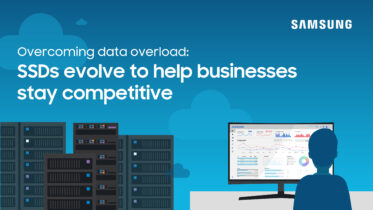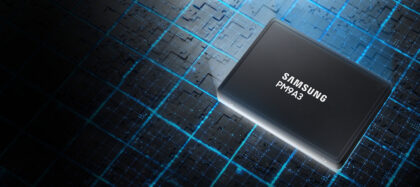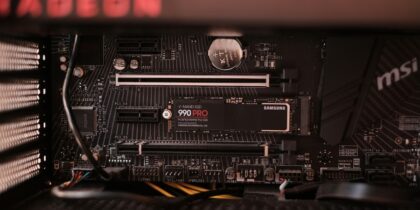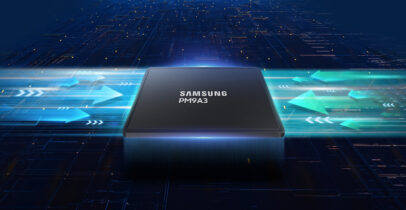Samsung offers a comprehensive lineup of solid state drives (SSDs) designed to perform under the myriad demands of many scenarios in the data center. Each drive has something unique to offer from a hardware perspective, and will shine in different industries and use cases.
860 DCT
The Samsung 860 DCT is comprised of advanced V-NAND chips for optimal performance in data centers at a great price and value point. When you need a storage solution that’s large and fast, but not necessarily the largest and fastest on the market, the 860 DCT has great value.
Available in the standard 2.5-in. form factor at capacities of 960 GB, 1,920 GB and 3,840 GB, the 860 DCT offers a sequential read speed at a maximum of 550 MB/s and sequential write speeds up to 520 MB/s. It also comes with a limited five-year, 0.2 Drive Writes Per Day (DWPD) warranty. The main purposes for the 860 DCT is to replace hard disk drives (HDDs) in servers, streaming servers and content delivery network servers, but it also provides significant power and compelling performance against spinning hard drives and other media.
883 DCT
The Samsung 883 DCT is engineered to be ultra-reliable and efficient in a data center environment with loads of other disks operating in tandem. The 883 DCT comes in a 2.5-in form factor that specializes in super quick storage while keeping an on capacity. It also has a SATA 3 interface with storage capacities up to 3.84 TB.
Which SSD Is Best for Your Deployment?
Take this quick assessment to determine the best storage fit for your needs. Download Now
Even at those large capacities, the drive still sings, with sequential read/write speeds of up to 560/520 MB/s and random read/write speeds of up to 98K/28K input/output operations per second (IOPS). The 883 DCT comes with end-to-end data protection and power loss protection and is covered by a limited five-year, 0.8 DWPD warranty. For scenarios where total capacity is important or servers have a mixed workload and SSDs are still preferable, the Samsung 883 DCT is your winner.
983 DCT
The Samsung 983 DCT benefit comes in the form of its PCIe NVMe interface that can provide four times the performance of a SATA drive. The 983 DCT is available in both M.2 and 2.5-in. form factors with capacities of 960 GB and 1.92 TB, making them well suited for situations where performance and overall storage capacity are equal concerns.
The 983 DCT offers sequential read/write speeds of up to 3,400/2,200 MB/s (2.5-in.) and random read/write speeds of up to 580K/52K IOPS (2.5-in.) and comes with end-to-end data protection and power loss protection. This SSD also comes with a five-year, 0.8 DWPD warranty. The 983 DCT is great for next generation servers’ PCIe support.
983 ZET
Last but not least, the Samsung 983 ZET is the premier performance drive for demanding applications where the lowest latency possible is the top priority. Essentially blurring the line between ultra-fast system RAM and superbly performing SSDs, the 983 ZET is driven by the finest low-latency V-NAND technology to read data as quickly as possible. It performs reads and writes in up to 0.03 millisecond (ms), with a minimal latency of up to 20 microseconds (μs). The drive can reach sequential read/write speeds up to 3,400/3,000 MB/s and random read/write speeds up to 750K/55K IOPS, making it a superior choice for applications and usage scenarios where performance is job one and all other factors are secondary.
The drive also has power loss protection to prevent data loss when system current is interrupted, and end-to-end data protection to ensure the integrity of all reads and writes across the entire data path. Samsung backs the 983 ZET with a limited five-year warranty or up to 10 DWPD (meaning all storage cells within the drive can be overwritten 10 times per day in the life of the warranty). It’s available in 480 GB and 960 GB capacities in the HHHL form factor.
The 983 ZET has the ability to go beyond the standard datacenter SSD and can be utilized for various next generation applications like those used in IOT, within caching servers, and for HPC applications as well.
Why Are SSDs Important?
SSDs offer performance and reliability far surpassing other nonvolatile media. SSDs used to have more limited capacities than traditional hard drives, which limited their appeal and suitability for certain enterprise applications. Now that prices are coming down as capacities increase, SSDs can find themselves suited for any number of enterprise use cases, including tremendously performing redundant arrays of independent disks (RAID).
Samsung Enterprise SSDs are built for ultra-high reliability and long service life, both of which are essential to data center storage arrays.
Are you over-provisioning your SSDs to improve their life cycles, memory and performance? Get your free guide to why you should — and how you can.







